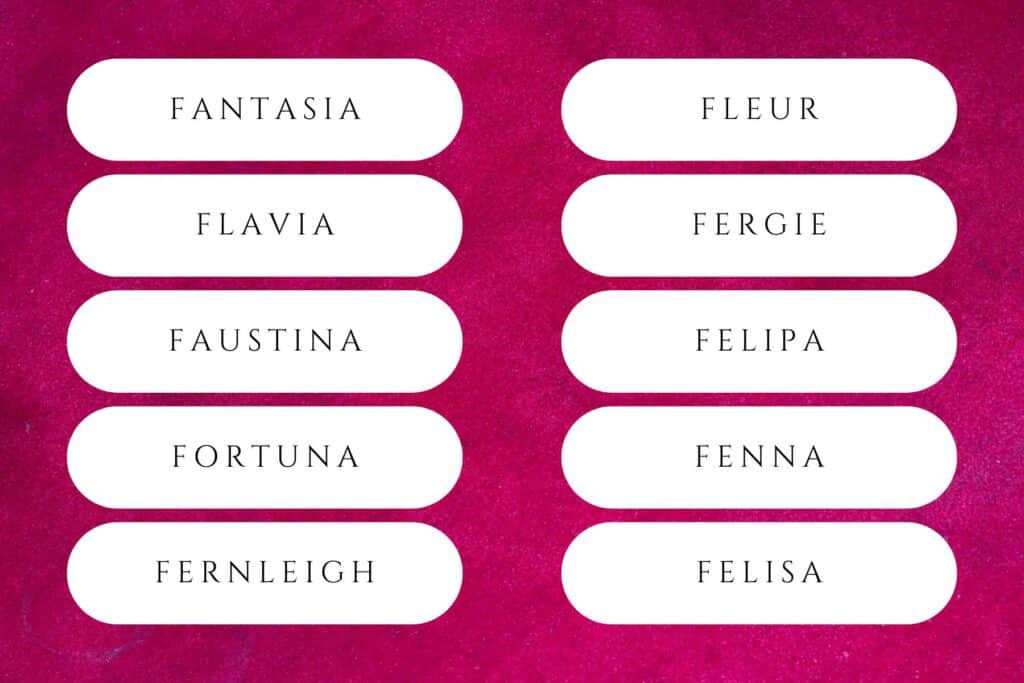From songs and lyrics to the people who shaped her story, these 100 Taylor Swift-inspired baby names offer the ultimate list for Swifties naming their future superstar.
Girl names that start with F accounted for less than 1% of all names given to baby girls in 2024.
That’s not too surprising considering it’s been a while since girl names starting with F were relevant in the U.S. — and most recently ranked as the 22nd most popular first initial in 2024, per Behind the Name.
In fact, the last time the letter “f” was a top-10 first initial was in 1906 — and names were a little different back then!
According to the Social Security Administration, the most popular girl names that start with F in 1906 were Florence (10th), Frances (14th) and Fannie (76th) — the only three F names to rank inside the top-100.

Flora, Flossie, Freda, Fern, Frieda and Faye were also popular in 1906 — each of which ranked in the top-200, per the SSA.
But fast forward to 2024 and none of those F girl names ranked inside the top-200 — or the top-300, for that matter.
In fact, the only two F girl names to rank in the top-300 last year were Freya (159th) and Faith (249th) — and Sofia (which ranked 10th) was the only other name to include the letter “f” anywhere in the name.
READ MORE: 50+ Baby Boy Names Starting With F That Are Familiar But Forgotten in Today’s Society
So, yeah — F names for girls aren’t just rare, but they’re teetering on the edge of being forgotten.
But that’s where you come into play.
If you’ve stumbled upon this article, then you’re one of the few parents looking to add a few girl names that start with F to your baby name list — and we’re all the way here for it!
So, let’s see if any of these F girl names are worth adding to your list. We’ve got plenty of them!

Francesca
Origin: Italian; Latin
Meaning: Frenchman
Francesca, pronounced fran-CHESS-kuh, is the Italian feminine form of Franciscus (Francis), which means “Frenchman” in Latin and is ultimately derived from the Germanic tribe of the Franks.
Fatima
Origin: Arabic
Meaning: To abstain; To wean; Exemplary woman
Fatima, pronounced fuh-TEE-muh, derives from the Arabic word fatama, meaning “to abstain” or “to wean.” In Islam, Fatima (Fatimah) is the daughter of the Prophet Muhammad and the exemplary woman.
Finley
Origin: Old Irish
Meaning: Blessed warrior; Fair warrior
Finley, pronounced FIN-lee, is a variant of Finlay and, ultimately, Fionnlagh or Findláech, which is composed of the Old Irish elements finn, meaning “white” or “blessed,” and láech, meaning “warrior.”
Frances
Origin: English; Late Latin
Meaning: Frenchman; Spear tribe
Frances, pronounced FRAN-siss, is the Anglicized feminine form of the Late Latin name Franciscus, meaning “Frenchman.” It’s derived from the Germanic tribe of Franks, known for the spear they used.
Fiona
Origin: Old Irish
Meaning: White; Blessed
Fiona, pronounced fee-OH-nuh, is the feminine form of the Old Irish name Fionn and word finn, meaning “white” or “blessed.” Fiona is the princess of Far Far Away and wife of Shrek in the “Shrek” franchise.
Frieda
Origin: Old German
Meaning: Peace; Peaceful
Frieda, pronounced FREE-duh, is a diminutive of names containing the Old German element fridu, which means “peace.” Many people treat it as the German form of the English nicknames Fred and Freddie.
Florence
Origin: Latin
Meaning: Flourishing; Blossoming
Florence, pronounced FLOR-ints, comes from the Latin name Florentius and Florentia, which derive from the Latin word florens, meaning “flourishing” or “blossoming.” It’s also the name of a major city in Italy.
Felicity
Origin: English; Latin
Meaning: Happiness; Good luck
Felicity, pronounced fuh-LISS-uh-tee, comes directly from the English word felicity, which derives from the Latin words felicitas and felix. In English, it means “happiness” or “that which is a source of happiness.”
Floella
Origin: English; Latin
Meaning: Flourishing; Flower
Floella, pronounced floh-EL-uh, is an elaborated form of Flo, which is often used as a nickname for names like Florence, which means “flourishing” in Latin, and Flora, which means “flower” in Latin.
Fernanda
Origin: Latin; Gothic
Meaning: Daring peace; Brave journey
Fernanda, pronounced FUR-nan-duh, is the Spanish and Italian form of Ferdinand, which is composed of the Gothic elements friþus, meaning “peace,” or farþa, meaning “journey,” and nanþa, meaning “daring.”

Faith
Origin: English; Latin
Meaning: Trust; Belief
Faith, pronounced FAYTH, comes directly from the English word faith, which derives from the Latin word fides and fido, meaning “trust.” It refers to having complete trust or confidence in someone or something.
Fluorine
Origin: Latin
Meaning: To flow; Chemical element
Fluorine, pronounced flor-EEN, derives from the Latin word fluere, meaning “to flow.” It refers to the most reactive chemical element on the Periodic Table of Elements, with symbol F and atomic number 9.
Freya
Origin: Old Norse
Meaning: Lady; Norse goddess
Freya, pronounced FRAY-uh, is the Anglicized form of the Old Norse name Freyja, meaning “lady.” Freya is the most important fertility goddess in Norse mythology who is associated with love, fertility and beauty.
Fannie
Origin: English; Late Latin
Meaning: Frenchman; Spear tribe
Fannie, pronounced FAN-ee, used to be a common nickname for Frances and Franciscus, which means “Frenchman” and is derived from the Germanic tribe of Franks, known for the type of spear they used.
Flora
Origin: Latin
Meaning: Flower; Flower goddess
Flora, pronounced FLOR-uh, derives from the Latin word flos, meaning “flower.” In Roman mythology, Flora was the goddess of flowers, often associated with the coming of spring and the fertility of the land.
Flossie
Origin: English; Latin
Meaning: Flourishing; Blossoming
Flossie, pronounced FLAW-see, used to be a common nickname for Florence, which derives from the Latin word florens, meaning “flourishing” or “blossoming.” It used to be more common as a given name.
Fern
Origin: Old English
Meaning: Ancient plant without flowers
Fern, pronounced FERN, comes directly from the English word fern (derived from Old English fearn), which refers to one of the oldest groups of plants on Earth that are known to not have flowers.
Freda
Origin: Old German
Meaning: Peace; Peaceful
Freda, pronounced FREE-duh, is a diminutive of names containing the Old German element fridu, which means “peace.” It can also be a shortened form of names such as Winifred, Alfreda and Frederica.
Frankie
Origin: English; Germanic; Latin
Meaning: Germanic tribe; Of French origin
Frankie, pronounced FRANG-kee, is a diminutive of Frank, which comes from the name of the Germanic tribe known as the Franks, and Frances, the feminine form of Francis meaning “Frenchman” or “of French origin.”
Floretta
Origin: Latin
Meaning: Flower
Floretta, pronounced flor-ET-uh, is a Latin diminutive of the name Flora, which derives from the Latin word flos, meaning “flower,” and refers to the Roman goddess of flowers associated with the coming of spring.

Filomena
Origin: Italian; Spanish; Greek
Meaning: Lover; To be loved
Filomena, pronounced fil-oh-MEE-nuh, is the Italian and Spanish form of Philomena, which comes from the Greek name Philoumene and is ultimately derived from the Greek word phileo, meaning “to love.”
Florida
Origin: Spanish
Meaning: Flowery; Full of flowers
Florida, pronounced FLOR-ih-duh, comes from the Spanish word florida, meaning “flowery” or “full of flowers.” This is where the U.S. state gets its name, though it can also be a feminine form of Floridus.
Felicia
Origin: Roman; Latin
Meaning: Lucky; Successful; Happy
Felicia, pronounced fuh-LEE-shuh, is the feminine form of Felicius, which comes from the Roman name Felix, meaning “lucky” or “successful” in Latin. It’s a more elaborate form of the English name Felicity.
Fallon
Origin: Irish
Meaning: Leader
Fallon, pronounced FAIL-ihn, is the Anglicized form of the Irish name Fallamhán, meaning “leader.” It was popularized by a character on the soap opera “Dynasty,” but is also the last name of Jimmy Fallon.
Fayola
Origin: English; Latin
Meaning: Fairy; Magical, The Fates
Fayola, pronounced fay-OH-luh or fye-OH-luh, is an elaboration of the name Fay, which comes from the English word fay, meaning “fairy” or “magical,” and the Latin word fata, meaning “the Fates.” It can also be a diminutive of the name Faith.
Farah
Origin: Arabic
Meaning: Joy; Happiness
Farah, pronounced FAIR-uh, comes from the Arabic word farih, meaning “joy” and “happiness.” It can also be spelled Farrah, as in “16 and Pregnant” star Farrah Abraham, or the Arabic way (Fariha or Fareeha).
Fawn
Origin: English
Meaning: Young deer
Fawn, pronounced FAWN, comes directly from the English word fawn, referring to a young deer. It’s a popular animal name that was used for Fawn Moscato, a character in “New Girl” played by Zoe Lister-Jones.
Fabiana
Origin: Roman; Latin
Meaning: Bean
Fabiana, pronounced fay-bee-AH-nuh, is the feminine form of the name Fabianus, which comes from the Roman name Fabius and is derived from the Latin word faba, meaning “bean.” Variants include Fabia and Favia.
Francene
Origin: French; Latin
Meaning: Frenchman
Francene, pronounced FRAN-seen, is a variant of Francine and Francois, which is the French form of Francis, meaning “Frenchman” in Latin and ultimately derived from the Germanic tribe of the Franks.
Frederica
Origin: Germanic
Meaning: Peaceful ruler; Peaceful queen
Frederica, pronounced freh-der-EE-kuh, is the feminine form of Frederick, which comes from the German name Friedrich and is composed of the Old German elements fridu, meaning “peace,” and rih, meaning “ruler” or “king.”

Fantasia
Origin: Italian; Greek
Meaning: Fantasy; Imagination
Fantasia, pronounced fan-TAY-zhuh, comes from the Italian word fantasia and Greek word phantasia, meaning “imagination” or “fantasy.” It was widely popularized by “American Idol” singer Fantasia Barrino.
Flavia
Origin: Roman; Latin
Meaning: Yellow; Golden
Flavia, pronounced FLAY-vee-uh, is the feminine form of Flavius, which originated as a Roman family name derived from the Latin word flavus, meaning “yellow” or “golden.” The masculine form of Flavio.
Faustina
Origin: Roman; Latin
Meaning: Auspicious; Lucky
Faustina, pronounced faw-STEE-nuh, is the feminine form of the Roman names Faustinus and Faustus, which means “auspicious” and “lucky” in Latin. It was a name given to several early Christian saints.
Fortuna
Origin: Roman; Latin
Meaning: Luck
Fortuna, pronounced for-TOO-nuh, comes directly from the Latin word fortuna, meaning “luck.” In Roman mythology, Fortuna was the goddess of chance, luck, and fate, and the counterpart to the Greek goddess Tyche.
Fernleigh
Origin: English
Meaning: Fern clearing; Fern meadow
Fernleigh, pronounced FERN-lee or FERN-lay, is a combination of the names Fern, referring to the ancient nonflowering plant, and Leigh, which comes from the Old English word leah, meaning “meadow.”
Fleur
Origin: French
Meaning: Flower
Fleur, pronounced FLUR, comes directly from the French word fleur (ultimately derived from the Latin word flos), meaning “flower.” It’s one of the many flower-inspired names, including Flora and Florella.
Fergie
Origin: Old Irish
Meaning: Strong woman; Woman of vigor
Fergie, pronounced FER-gee, is a diminutive of Fergus, which comes from the Old Irish elements fer, meaning “man,” and guss, meaning “vigor” or “strength.” Other variants include Ferris and Farris.
Felipa
Origin: Spanish; Portuguese; Greek
Meaning: Friend of horses
Felipa, pronounced fuh-LEE-puh, is the Spanish feminine form of Philip, which comes from the Greek name Philippos and is composed of the elements philos, meaning “friend,” and hippos, meaning “horse.”
Fenna
Origin: Latin; Gothic
Meaning: Daring peace; Brave journey
Fenna, pronounced FEH-nuh, is the feminine form of Fen, which is traditionally used as a diminutive of the name Ferdinand, which is composed of the Gothic elements friþus, meaning “peace,” or farþa, meaning “journey,” and nanþa, meaning “daring.”
Felisa
Origin: Roman; Latin
Meaning: Lucky; Successful
Felisa, pronounced fuh-LEE-suh, is a variant of Felicia, which comes from the Roman name Felix, meaning “lucky” or “successful” in Latin. It’s yet another unique form of the English name Felicity.

Fransisca
Origin: Spanish; Latin
Meaning: Frenchman
Fransisca, pronounced fran-SISS-kuh, is the feminine form of Franciscus(Francis), which means “Frenchman” in Latin and is ultimately derived from the Germanic tribe of the Franks, who were named after the type of spear they used.
Freddie
Origin: Old German
Meaning: Peaceful ruler; Peace to the king
Freddie, pronounced FRED-ee, is a variant of Freddy and diminutive of the German name Frederick, which is composed of the Old German elements fridu, meaning “peace,” and rih, meaning “ruler” or “king.”
Fiadh
Origin: Irish
Meaning: Wild animal; Deer; Respect
Fiadh, pronounced FEE-uh, is an Irish name that comes from the Irish word fia, meaning “wild animal” or “deer.” It can also translate to “respect” in Irish. It’s not as popular in the U.S. as it is in Irish-speaking countries.
Fedora
Origin: English; Greek
Meaning: Type of hat; Gift from God
Fedora, pronounced fih-DOR-uh, comes directly from the English word fedora, referring to a hat with a soft brim and indented crown. It can also be a variant of Theodora, which means “gift from God” in Greek.
Fable
Origin: English; French; Latin
Meaning: Fictitious; Moral-driven story
Fable, pronounced FAY-buhl, comes directly from the English word fable (from Old French fable and Latin fabula), meaning “fictitious” or “a short, fictional story that typically features animals and a moral lesson.“
Fia
Origin: Irish
Meaning: Wild animal; Deer; Respect
Fia, pronounced FEE-uh, comes directly from the modern Irish word fia, meaning “wild animal” or “deer,” though it can also mean “respect.” Dropping the “dh” at the end makes the name appear more American.
Fabienne
Origin: Roman; Latin
Meaning: Bean
Fabienne, pronounced fay-bee-EN, is the feminine of Fabian, which comes from the Roman names Fabianus and Fabius and is derived from the Latin word faba, meaning “bean.” You can also go with Fabia.
Faline
Origin: English
Meaning: Female deer; Doe
Faline, pronounced fay-LEEN, is an invented name that was used for a character in “Bambi.” In the movie, Faline is the daughter of Ena and one of Bambi's childhood friends, who later becomes his wife.
Faelynn
Origin: English; Welsh
Meaning: Magical lake
Faelynn, pronounced FAY-lin, is a combination of the names Fae, meaning “fairy” and “magical” in English, and Lynn, meaning “lake” via the Welsh word llyn. It sounds similar to names like Braelyn or Gracelynn.
Franny
Origin: English; Late Latin
Meaning: Frenchman; Spear tribe
Franny, pronounced FRAN-ee, is a common nickname for Frances and Franciscus, which means “Frenchman” and is derived from the Germanic tribe of Franks, known for the type of spear they used.
What’s the Verdict on Girl Names That Start With F?

And there you have it — a full lineup of F names for girls that prove this letter still has plenty to offer.
While it may not be the most popular initial, that’s exactly what makes it such a hidden gem. And since it’s not used very often today, your daughter will grow up with a name that sets her apart from the crowd.
At the same time, the letter “f” is just one of 26 first initials parents can choose from.
Whether you're drawn to the elegance of names beginning with E, the charm of C names, or the strength of names that start with V — each letter comes with its own unique flare for your future daughter.
And if you’re looking to think outside of the box, then Mod Moms Club has you covered.
From the baby name lists we upload every week to our baby name generator that allows you to narrow down a list of ideas based on your personal preferences — the perfect name is just one search away.
ALSO ON MOD MOMS CLUB: 75 Baby Girl Names That End in IE
So, get your handy dandy notebook out, jot down your favorite ideas and enjoy the naming process!












